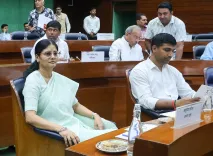Is the Centre Ready to Adopt the 1600-Series Call System? A Pilot with 7 Banks Underway

Synopsis
Key Takeaways
- The 1600 series aims to secure communications in the BFSI sector.
- A pilot project with major banks is already in progress.
- Consumers will gain more control over their commercial communication consents.
- Regulators are collaborating to enhance protections against fraud.
- Automated data exchanges will strengthen the fight against cyber fraud.
New Delhi, July 22 (NationPress) In an effort to combat the increasing instances of digital payment-related fraud and the exploitation of telecom systems, the government convened on Tuesday to discuss accelerating the rollout of the "1600" mobile series.
The Telecom Regulatory Authority of India (TRAI) held a meeting with the Joint Committee of Regulators (JCoR) in the national capital, focusing on implementing collaborative regulatory strategies.
The '1600' series is a designated phone numbering range intended solely for voice calls originating from regulated entities within the banking, financial services, insurance (BFSI), and securities sectors.
During the meeting, regulators outlined a timeline for transitioning to the 1600-number series. Recognizing the varying scales of operations among entities, they agreed that this migration should occur gradually, guided by inputs from sector-specific regulators, according to an official statement.
The committee also highlighted the misuse of Session Initiation Protocol (SIP) and Primary Rate Interface (PRI) telecom lines for mass spam distribution. Possible measures being considered include allocating these lines from a specific number range and implementing additional safeguards to promote responsible usage.
Moreover, TRAI announced a significant pilot initiative aimed at providing consumers greater control over commercial communications by replacing unverifiable offline consents with a secure digital consent framework.
This new system will allow consumers to digitally register, review, and revoke their consents through a simple, unified, and tamper-proof interface. Major banks including SBI, PNB, ICICI, HDFC, Axis Bank, Canara Bank, and Kotak Mahindra Bank will collaborate with telecom service providers for this pilot project.
At the meeting, TRAI Chairman Anil Kumar Lahoti praised the Department of Telecommunications’ recent launch of the Financial Fraud Risk Indicator (FRI), which identifies numbers linked to financial scams. He emphasized the necessity for practical safeguards against spam and fraud without imposing undue burdens on legitimate businesses. He urged sectoral regulators to hasten implementation efforts within their domains and closely monitor the progress.
The committee also deliberated on the need for an automated exchange of spam and cyber fraud data between the Indian Cyber Crime Coordination Centre (I4C), the Digital Intelligence Platform of the Department of Telecommunications, and the DLT platform managed by access providers. Such cooperation can facilitate prompt actions against the telecom resources of fraudsters, including disconnecting their numbers.
Representatives from the Reserve Bank of India (RBI), Securities and Exchange Board of India (SEBI), Insurance Regulatory and Development Authority of India (IRDAI), and Pension Fund Regulatory and Development Authority (PFRDA) met with officials from various ministries.
Additionally, TRAI recently upgraded its SMS header portal to assist customers in identifying the entities sending commercial messages through specific SMS headers.









